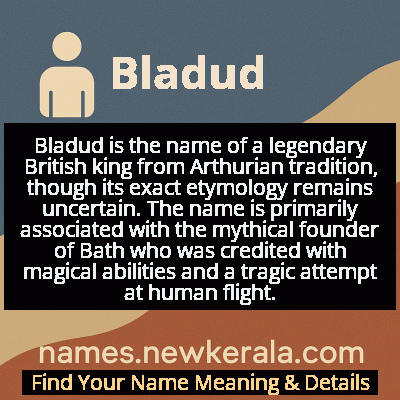Bladud Name Meaning & Details
Origin, Popularity, Numerology Analysis & Name Meaning of Bladud
Discover the origin, meaning, and cultural significance of the name BLADUD. Delve into its historical roots and explore the lasting impact it has had on communities and traditions.
Name
Bladud
Gender
Male
Origin
Arthurian
Lucky Number
8
Meaning of the Name - Bladud
Bladud is the name of a legendary British king from Arthurian tradition, though its exact etymology remains uncertain. The name is primarily associated with the mythical founder of Bath who was credited with magical abilities and a tragic attempt at human flight.
Bladud - Complete Numerology Analysis
Your Numerology Number
Based on Pythagorean Numerology System
Ruling Planet
Saturn
Positive Nature
Ambitious, efficient, realistic, and authoritative.
Negative Traits
Materialistic, stressed, confrontational, and can be overly ambitious.
Lucky Colours
Dark blue, black.
Lucky Days
Saturday.
Lucky Stones
Blue sapphire, amethyst.
Harmony Numbers
2, 4, 6.
Best Suited Professions
Business leaders, managers, financial services, law enforcement.
What People Like About You
Leadership, determination, organizational skills.
Famous People Named Bladud
Bladud
Legendary King of Britain
Founder of Bath and credited with introducing necromancy to Britain
Bladud of Cornwall
Arthurian Knight
One of King Arthur's knights mentioned in Welsh triads
Prince Bladud
Mythical Prince
Central figure in the founding myth of Bath's hot springs
Name Variations & International Equivalents
Click on blue names to explore their detailed meanings. Gray names with will be available soon.
Cultural & Historical Significance
The cultural significance of Bladud extends beyond his role as a legendary monarch to encompass themes of innovation, mystical knowledge, and the intersection of British and Classical traditions. Educated in Athens and skilled in mathematics and magic, he represents the transmission of Classical learning to ancient Britain. His association with necromancy positions him as a keeper of ancient wisdom, while his tragic death while attempting flight with constructed wings echoes the Greek myth of Icarus, suggesting cultural cross-pollination. In Arthurian contexts, later traditions sometimes connect him to the broader mythological framework surrounding Camelot, making him part of the rich pre-Arthurian backstory that gives depth to the British legendary cycle.
Extended Personality Analysis
The legendary figure of Bladud presents a complex personality profile that combines intellectual brilliance with mystical inclinations and ambitious vision. Historical accounts portray him as deeply learned, having studied in Athens where he mastered mathematics and the magical arts, suggesting a curious, analytical mind drawn to both rational and supernatural knowledge. His establishment of Bath as a healing center demonstrates practical wisdom and compassionate leadership, showing concern for his people's wellbeing. This combination of scholarly pursuit and practical application indicates a well-rounded intellect capable of translating abstract knowledge into tangible benefits for his kingdom.
Bladud's personality also reveals a bold, experimental nature willing to challenge conventional boundaries. His practice of necromancy shows comfort with esoteric knowledge and the supernatural realm, while his flying attempts demonstrate both innovative thinking and the classic heroic flaw of overreaching ambition. The tragic outcome of his flight attempts suggests a personality driven by visionary goals but potentially lacking in practical caution. This blend of intellectual depth, spiritual exploration, and daring innovation creates a portrait of a Renaissance man centuries before the Renaissance—a ruler who balanced governance with personal quests for knowledge, embodying both the potential and perils of human ambition when coupled with extraordinary abilities.
Modern Usage & Popularity
In contemporary naming practices, Bladud remains an exceptionally rare and specialized choice, primarily confined to contexts where Arthurian legend or British mythological heritage is explicitly celebrated. The name has never registered in official baby name statistics in any English-speaking country and is largely unknown to the general public. Its modern usage is predominantly limited to historical reenactment communities, Arthurian enthusiast circles, academic discussions of Celtic mythology, and occasional appearances in fantasy literature or games drawing from British legendary sources. In Cornwall and Wales, where Celtic identity is actively preserved, the name might see rare revival as part of cultural heritage projects, but it remains far outside mainstream naming trends. The name's strong association with specific legendary narratives and its archaic sound make it a bold, unconventional choice that signals deep engagement with British mythological traditions rather than contemporary naming fashion.
Symbolic & Spiritual Meanings
Symbolically, Bladud represents multiple layers of meaning drawn from his legendary attributes and narrative arc. As the discoverer of Bath's healing springs, he embodies themes of purification, restoration, and the transformative power of nature—symbolizing the human capacity to find healing in unexpected places. His association with necromancy positions him as a guardian of esoteric knowledge and a mediator between the living and spiritual realms, representing humanity's eternal fascination with life beyond death. The tragic flight attempt that ended his life serves as a powerful symbol of both human aspiration and the dangers of overreaching ambition, echoing the Icarus myth while grounding it in British soil. Collectively, these symbolic dimensions paint Bladud as a figure of boundary-crossing—between nature and supernature, innovation and tradition, healing and danger—making his name carry connotations of ancient wisdom, royal responsibility, and the perpetual human quest to transcend limitations through both practical and mystical means.

